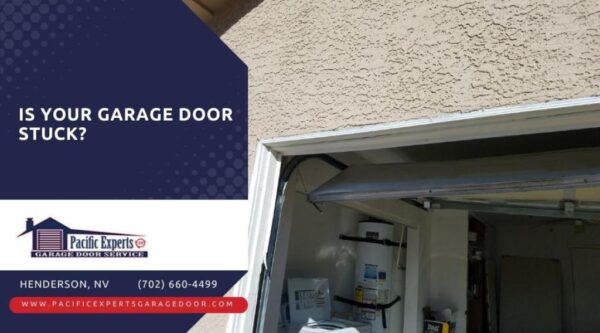Urgent garage door repair is a situation no one wants to face, and when your garage door gets stuck, it can be incredibly frustrating. We've all been there, standing in our driveways, pressing that remote button repeatedly, hoping for an immediate fix. In this article, we aim to demystify the reasons behind a stuck garage door and offer straightforward solutions to get it moving again. Is your garage door stuck? Read on.
- Common Reasons for a Stuck Garage Door
- Signs of a Stuck Garage Door
- Unusual Sounds
- Uneven Movement
- Slow Responses
- Partial Opening
- No Movement at All
- Quick Solutions for a Stuck Garage Door
- Prioritize Safety First
- Start with a Visual Inspection
- Apply Garage Door Lubricant
- Ensure Sensor Alignment and Cleanliness
- Don't Forget the Remote Control
- Call in Professionals for Complex Repairs
- Embrace Preventive Maintenance
- Have a Stuck Garage Door? Call Pacific Experts Today
- Frequently Asked Questions
- Why is my garage door making a grinding noise?
- Can I fix a misaligned garage door sensor myself?
- How often should I lubricate my garage door?
- Is it safe to replace garage door springs on my own?
- What's the average cost of garage door repair services?
Common Reasons for a Stuck Garage Door
One of the primary reason is broken springs, which bear the weight of the door and, when snapped, prevent smooth operation. If you've heard a loud bang, it might be a sign of a broken spring. Damaged rollers or tracks are another frequent issue. Over time, these components can become misaligned or damaged, causing your door to get stuck. Regular inspections and maintenance can prevent such troubles. Misaligned sensors, common in modern garage doors, can also lead to problems. When these sensors don't face each other correctly, the door may refuse to close. A quick check for obstructions and sensor alignment can often resolve this.
Signs of a Stuck Garage Door
Before diving into solutions, it's essential to recognize when your garage door is stuck.
Unusual Sounds
When your garage door is stuck, it often communicates its distress through unusual garage door sounds. Pay close attention to any grinding or scraping noises that occur when you're either opening or closing the door. These sounds can be an early warning sign of underlying issues, such as misaligned tracks or damaged rollers.
Uneven Movement
Another telltale sign that your garage door is experiencing problems is uneven movement. If you notice your door tilting or jerking as it attempts to open or close, it's a clear indication that something isn't working correctly. These irregular movements can be attributed to various issues, including damaged rollers, misaligned tracks, or problems with the garage door opener.
Slow Responses
A garage door that's slow to respond can be a frustrating experience. You might press the remote or wall button, and there's a noticeable delay before the door starts moving. This delayed reaction is often a symptom of issues with the garage door opener or electrical components. It's crucial not to ignore this sign, as it could worsen over time.
Partial Opening
Sometimes, your garage door may tease you by partially opening before coming to a halt. This scenario is a strong indicator of trouble in the making. It could signify problems with the tracks, rollers, or the garage door's balance. As CNET explains, garage door openers have a switch you can change to decide how low the door goes when closing. If this switch is set too high for your garage, the door might not shut completely. You can fix this by finding a screw on the motor unit. When you turn it, the door will either go down more or less when it closes.
No Movement at All
The most evident and alarming sign of a stuck garage door is when it simply refuses to move. If you press the remote or use the wall button, and there's no response—no lifting, lowering, or even the faintest attempt to budge—your garage door is in dire need of attention. At this point, it's time to assess the situation and consider the appropriate course of action to get it back on track.
Quick Solutions for a Stuck Garage Door
Before attempting any fixes, ensure your safety by disconnecting the power to the garage door opener and keeping your hands away from moving parts.
Prioritize Safety First
Before diving into any troubleshooting, it's essential to prioritize your safety. Begin by disconnecting the power to the garage door opener. This step ensures that there's no unexpected movement while you're working on the door. Additionally, always keep your hands and fingers away from moving parts to avoid accidents. Safety goggles can be a good idea when inspecting and handling components.
Start with a Visual Inspection
A visual inspection is the first step in identifying the root cause of your garage door issues. Examine the tracks for any obstructions or debris that might be hindering the door's movement. Check the rollers for damage, misalignment, or wear and tear. Broken or damaged springs can also lead to a stuck garage door, so inspect them closely. If you notice any issues during this inspection, it's crucial to address them promptly.
Apply Garage Door Lubricant
Regular maintenance can go a long way in preventing garage door problems. One effective maintenance task is applying garage door lubricant to critical components such as rollers, tracks, and hinges. Lubrication helps reduce friction and ensures smoother door movement. Be sure to use a lubricant specifically designed for garage doors to achieve the best results. This simple step can make a noticeable difference in the door's performance.
Ensure Sensor Alignment and Cleanliness
Modern garage doors are equipped with safety sensors that detect obstacles in the door's path. These sensors need to be aligned correctly to function properly. Check whether they are facing each other and aligned as they should be. Clean the sensor lenses to remove dirt, dust, or cobwebs, which can interfere with their operation. Ensuring that your sensors are in top condition is crucial for the door's safe and smooth operation.
Don't Forget the Remote Control
Sometimes, the issue might not lie with the door itself but with the remote control. If your remote control is experiencing delays or unresponsiveness, it's a good idea to check its batteries. Replacing the batteries can often resolve this problem. Additionally, consider reprogramming the remote control to sync it with the opener, ensuring seamless operation.
Call in Professionals for Complex Repairs
For more complex issues like broken springs or electrical problems, it's wise to leave the repairs to the experts. Handling broken springs can be hazardous due to the high tension involved, and attempting DIY repairs in such cases is not recommended. Professional technicians have the experience and tools needed to safely address these issues and get your garage door back on track.
Embrace Preventive Maintenance
To avoid future problems and keep your garage door running smoothly, embrace a preventive maintenance routine. Schedule regular garage door maintenance and inspections with a professional service provider. Keep the tracks clean and free of debris, and promptly replace worn-out parts. A proactive approach to maintenance can save you from dealing with more significant and costly issues down the line.
Have a Stuck Garage Door? Call Pacific Experts Today
While a stuck garage door can be a headache, knowing how to deal with it and taking preventive measures can keep it running smoothly. Safety should always be your top priority, and when in doubt, it's best to enlist the help of experts. Remember, a well-maintained garage door is a reliable one.
When your garage door woes require professional attention, Pacific Experts is here to help. Our experienced technicians specialize in diagnosing and resolving a wide range of garage door issues, including broken springs, electrical problems, and sensor misalignment. Don't let a stuck garage door disrupt your day—reach out to Pacific Experts for prompt, reliable garage door repair in a Las Vegas emergency.
Frequently Asked Questions
Why is my garage door making a grinding noise?
Grinding noises often indicate issues with the rollers, tracks, or springs. It's best to inspect and address these problems promptly.
Can I fix a misaligned garage door sensor myself?
Yes, you can realign sensors yourself by adjusting their position and cleaning the lenses. However, if you're unsure, it's wise to consult a professional.
How often should I lubricate my garage door?
Lubrication should be done every six months to a year, depending on usage. Regular maintenance is key to preventing issues.
Is it safe to replace garage door springs on my own?
Garage door spring replacement can be dangerous due to the high tension involved. It's recommended to hire a professional for this task.
What's the average cost of garage door repair services?
The cost varies depending on the type of repair needed. Basic repairs might cost less, while major issues like spring replacement can be more expensive. It's best to get a quote from a reputable service provider.



